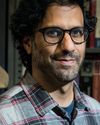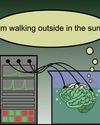Hannah Arendt & the Banality of Evil

On the evening of 11th May 1960, the Israeli intelligence agency Mossad grabbed Adolf Eichmann off a street in a quiet district of Buenos Aires. Eichmann, formerly an SS officer and administrator, had been the key figure in organising the transportation of millions of Jews across Europe to the Nazi concentration camps. It was no wonder that Mossad wanted a word with him.
Upon capture, he was flown to Israel, and taken to trial on the 11th April 1961. The New Yorker commissioned the German Jewish political thinker Hannah Arendt to cover the trial. The trial ended in December 1961 with Eichmann's conviction for "crimes against the Jewish people, crimes against humanity, and war crimes during the whole period of the Nazi regime." Arendt's report, based on her observations of the defendant and of the conduct of the trial, was published in 1963 in her book Eichmann in Jerusalem: A Report on the Banality of Evil.
In her report, Arendt grappled with an enigmatic question: can one commit evil deeds without being innately evil? Her conclusion was a shocking and provocative theory which defied the conventional representation of evil as exceptional and demonic. Arendt did not see in Eichmann the monstrosity of a psychopath, but rather the mediocrity of a bland, mundane, unimaginative human being who, in her words, was "neither perverted nor sadistic... but terribly and terrifyingly normal" (p.276). According to Arendt, Eichmann had not recognised the atrocity of his acts due to a particular "inability to think, namely, to think from the standpoint of somebody else" (p.49). On the basis of what she saw and heard at the trial, she concluded that while acts of evil can result in monumental tragedies, the perpetrators of these acts need not in every case be inherently evil people. They may have motives they do not recognise as evil, and which may, indeed, be 'banal'.
この記事は Philosophy Now の October/November 2023 版に掲載されています。
7 日間の Magzter GOLD 無料トライアルを開始して、何千もの厳選されたプレミアム ストーリー、9,500 以上の雑誌や新聞にアクセスしてください。
すでに購読者です ? サインイン
この記事は Philosophy Now の October/November 2023 版に掲載されています。
7 日間の Magzter GOLD 無料トライアルを開始して、何千もの厳選されたプレミアム ストーリー、9,500 以上の雑誌や新聞にアクセスしてください。
すでに購読者です? サインイン

Affirmative Action for Androids
Jimmy Alfonso Licon asks, when should we prioritise android rights?

Welcome to the Civilization of the Liar's Paradox
Slavoj Žižek uncovers political paradoxes of lying.

The Importance of the Purple
Massimo Pigliucci looks for threads of integrity in a morally compromised world.

Ethics for the Age of AI
Mahmoud Khatami asks, can machines make good moral decisions?

Anand Vaidya (1976-2024)
Manjula Menon on the short but full career of a 'disciplinary trespasser'.

Studying Smarter with AI?
Max Gottschlich on sense and nonsense when using AI in academia.

Excusing God
Raymond Tallis highlights the problem of evil.

Stephen Fry
Perhaps unshockingly for someone who is an actor, broadcaster, comedian, director, narrator and writer, Stephen Fry has a deep interest in words and how we use them. After hearing him lecture on that subject, Marcel Steinbauer-Lewis asked him about Artificial Intelligence and how it connects with the extraordinary lure of language.

Is VR Meaningful Escapism?
Amir Haj-Bolouri enquires into possible meaning through technology.

What Simone de Beauvoir Got — And Didn't Get – About Motherhood
Nura Hossainzadeh argues that motherhood is both physical and transcendent.
